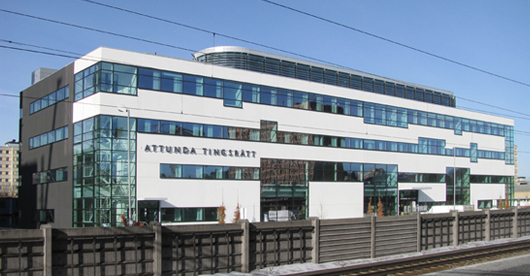District courts of Sweden on:
[Wikipedia]
[Google]
[Amazon]
 The district courts of Sweden ( sv, tingsrätt) are the court of first instance for the general courts in
The district courts of Sweden ( sv, tingsrätt) are the court of first instance for the general courts in
 The general courts in Sweden deal with criminal and civil cases. Criminal cases are the cases in which someone stands trial under the suspicion of having committed an act defined in the Swedish Penal Code or in another law, for which a sanction is prescribed, like theft or tax offences. Civil cases are cases where two parties are in disagreement, for example, over the contents of a business agreement or cases relating to
The general courts in Sweden deal with criminal and civil cases. Criminal cases are the cases in which someone stands trial under the suspicion of having committed an act defined in the Swedish Penal Code or in another law, for which a sanction is prescribed, like theft or tax offences. Civil cases are cases where two parties are in disagreement, for example, over the contents of a business agreement or cases relating to
SFS 1982:996
. The district courts are general lower courts and usually courts of first instance. In the district courts, a judge other than the president of a court or a division of a court is simply titled ''Judge'' (). A judge who presides over a division is titled ''Senior Judge'' (), and the head official of the district court is titled ''Chief Judge'' (). Each district court has a Chief Judge, and usually one or more permanent salaried judges (). In order to be accepted for training as a judge one must be a Swedish citizen, hold a degree of bachelor of law at minimum and earned qualifications as a court clerk. There are also more than 5,000
There are also more than 5,000
 At main hearings in criminal cases the district courts are prescribed to consist of one legally qualified judge and three lay judges. In criminal cases where the penalty is imprisonment, the presence of lay judges is required. However, if a lay judge is unable to attend after a main hearing has commenced, the bench constitutes a quorum with one legally qualified judge and two lay judges. In simpler criminal cases, where the penalty is a fine or where the legislation calls for imprisonment not exceeding six months, a legally qualified judge, without lay judges, constitutes the quorum.
At main hearings in criminal cases the district courts are prescribed to consist of one legally qualified judge and three lay judges. In criminal cases where the penalty is imprisonment, the presence of lay judges is required. However, if a lay judge is unable to attend after a main hearing has commenced, the bench constitutes a quorum with one legally qualified judge and two lay judges. In simpler criminal cases, where the penalty is a fine or where the legislation calls for imprisonment not exceeding six months, a legally qualified judge, without lay judges, constitutes the quorum.
List of district courts
on the official website of the
SFS 1982:996
 The district courts of Sweden ( sv, tingsrätt) are the court of first instance for the general courts in
The district courts of Sweden ( sv, tingsrätt) are the court of first instance for the general courts in Sweden
Sweden, formally the Kingdom of Sweden,The United Nations Group of Experts on Geographical Names states that the country's formal name is the Kingdom of SwedenUNGEGN World Geographical Names, Sweden./ref> is a Nordic country located on ...
. The next instance are the courts of appeal (). The district court handle criminal cases, some civil law disputes and a number of non-contentious matters. There are 48 district courts across Sweden, and the catchment area
In human geography, a catchment area is the area from which a location, such as a city, service or institution, attracts a population that uses its services and economic opportunities. Catchment areas may be defined based on from where people are ...
is based on the geographic boundaries of several municipalities
A municipality is usually a single administrative division having corporate status and powers of self-government or jurisdiction as granted by national and regional laws to which it is subordinate.
The term ''municipality'' may also mean the go ...
. The number of employees vary, from ten to several hundreds.
Types of cases
 The general courts in Sweden deal with criminal and civil cases. Criminal cases are the cases in which someone stands trial under the suspicion of having committed an act defined in the Swedish Penal Code or in another law, for which a sanction is prescribed, like theft or tax offences. Civil cases are cases where two parties are in disagreement, for example, over the contents of a business agreement or cases relating to
The general courts in Sweden deal with criminal and civil cases. Criminal cases are the cases in which someone stands trial under the suspicion of having committed an act defined in the Swedish Penal Code or in another law, for which a sanction is prescribed, like theft or tax offences. Civil cases are cases where two parties are in disagreement, for example, over the contents of a business agreement or cases relating to family law
Family law (also called matrimonial law or the law of domestic relations) is an area of the law that deals with family matters and domestic relations.
Overview
Subjects that commonly fall under a nation's body of family law include:
* Marriage, ...
. The district court also handles a number of other non-contentious matters; such as adoption and appointment of legal guardian
A legal guardian is a person who has been appointed by a court or otherwise has the legal authority (and the corresponding duty) to make decisions relevant to the personal and property interests of another person who is deemed incompetent, call ...
s. Proceedings are generally open to the public, but access can be restricted for example in cases about sexual offences.
Organization
Sweden is divided into 48 judicial districts (), as prescribed by the governmentSFS 1982:996
. The district courts are general lower courts and usually courts of first instance. In the district courts, a judge other than the president of a court or a division of a court is simply titled ''Judge'' (). A judge who presides over a division is titled ''Senior Judge'' (), and the head official of the district court is titled ''Chief Judge'' (). Each district court has a Chief Judge, and usually one or more permanent salaried judges (). In order to be accepted for training as a judge one must be a Swedish citizen, hold a degree of bachelor of law at minimum and earned qualifications as a court clerk.
 There are also more than 5,000
There are also more than 5,000 lay judges A lay judge, sometimes called a lay assessor, is a person assisting a judge in a trial. Lay judges are used in some civil law jurisdictions. Lay judges are appointed volunteers and often require some legal instruction. However, they are not permane ...
() linked to the district courts. Lay judges are laymen, not legally qualified representatives of the people, appointed by the municipal assembly, serving four years at a time. The district court make use of lay judges in criminal cases only.
Quorum of the court
The main rule in civil cases is that the district court should consist of three legally qualified judges, but there are several exceptions to this rule. In simple cases, and if the parties agree to it, the court can consist of one legally qualified judge. Another exception is if the value of the claim is obviously low (not exceeding approximately SEK 22,000 in 2012), then thequorum
A quorum is the minimum number of members of a deliberative assembly (a body that uses parliamentary procedure, such as a legislature) necessary to conduct the business of that group. According to ''Robert's Rules of Order Newly Revised'', the ...
is also one legally qualified judge. If a judge is excused after the commencement of the main hearing, the remaining two judges constitute a quorum.
Appeal
The person who has been convicted, the prosecutor and the victim of the crime can appeal against a district court in the appellate court. This must be made within three weeks of the date of the judgement. In some circumstances a leave to appeal is required, meaning a legally trained person at thecourt of appeal
A court of appeals, also called a court of appeal, appellate court, appeal court, court of second instance or second instance court, is any court of law that is empowered to hear an appeal of a trial court or other lower tribunal. In much of t ...
will examine the case and present a report to three qualified judges, before the case can proceed. If there is reason to believe that the next instance would arrive at a conclusion different from that of the district court, a leave to appeal will be granted. A judgement in a civil case can also similarly be appealed.
List and map of general courts
The map shows geographic boundaries of the general courts, i.e. the district courts and its appellate court.See also
*Judiciary of Sweden
The judicial system of Sweden consists of the law of Sweden and a number of government agencies tasked with upholding security and rule of law within the country. The activities of these agencies include police and law enforcement, prosecution, c ...
* Crime in Sweden
Crime in Sweden is defined by the Swedish Penal Code ( sv, Brottsbalken) and in other Swedish laws and statutory instruments.
Over the past decades, the number of reported crimes in Sweden has increased slightly. This fact is due to several ...
Notes
:1.{{note, a}List of district courts
on the official website of the
Swedish National Courts Administration
The Swedish National Courts Administration (SNCA) ( sv, Domstolsverket) is a Swedish administrative authority organized under the Ministry of Justice. It functions as a service organisation for the Swedish courts, including the general courts, t ...
anSFS 1982:996
References